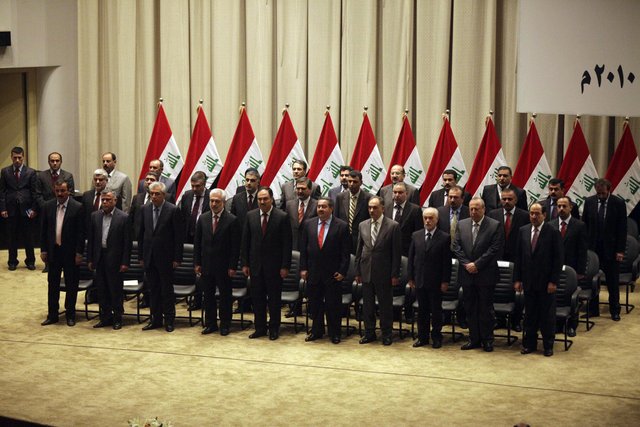
NEW IRAQI GOVERNMENT SWORN IN - AT LAST
Barbara Surk and Qassim Abdul-Zahra - Associated Press
BAGHDAD (AP) - Parliament swore in a new Iraqi government Tuesday after nine months of bitter political haggling, solidifying the grip that Shi'ites have held on political power since Saddam Hussein's ouster while leaving open the question of whether the country's disgruntled Sunni minority will play a meaningful role.
The new government led by Shi'ite incumbent Prime Minister Nouri al-Maliki got off to a shaky start as disagreements among coalition partners prevented Mr. al-Maliki from naming 13 of his 42 Cabinet ministers. And the fragile coalition must address enormous and pressing challenges such as the heavy cost of rebuilding from the devastation seven years of war has wrought and lingering sectarian tensions that periodically explode into violence.
Another urgent priority will be leading the country through the withdrawal of American troops, scheduled for the end of next year. More than 4,400 American troops and tens of thousands of Iraqis died in a war that has yet to bring stability and prosperity to this oil-rich Middle Eastern nation.
Lawmakers approved 29 ministers, including Mr. al-Maliki, to form the new government. The remainder of the 42-member Cabinet is made up of acting ministers who will be replaced at a later date because of ongoing disputes between coalition partners.
"The most difficult task in the world is forming a national unity government in a country where there is a diversity of ethnic, sectarian and political backgrounds," Mr. al-Maliki said before the vote.
He vowed to create a government that would combat terrorism, address the still-festering sectarian divisions and repair relations with neighboring Sunni-dominated Arab countries, who are largely suspicious of the Shi'ite-led government. The new Cabinet members were sworn in immediately following the nationally televised vote that approved them.
Iraqis elections on March 7 did not give any single bloc a majority in the 325-member parliament, leading to nine months of political jockeying to form the new government. Although Mr. al-Maliki's coalition came in a close second to a Sunni-backed coalition led by former Prime Minister Ayad Allawi, it was Mr. al-Maliki who was able eventually to patch together the necessary support needed to keep his office.
The new government includes members of all of Iraq's major political and sectarian factions, including Shi'ites, Sunnis and Kurds. The vote Tuesday was largely a display of unity that belies the still festering problems between the Shi'ite majority and the Sunni minority that used to make up the backbone of the insurgency. Sunnis dominated the regime under Saddam.
Mr. Allawi, who at one point vowed to never join an al-Maliki-led government, told lawmakers ahead of the vote that his bloc of 91 lawmakers would support and cooperate with the new government.
One of the key questions leading up to the government formation was the role that the Sunni-backed Iraqiya coalition would play. U.S. officials lobbied heavily for Mr. Allawi to be included in some fashion, fearing that leaving him and the Iraqiya coalition out of the government entirely or excluding it from meaningful roles would incite a return to the type of sectarian violence that at one point almost tore the country apart.
Mr. Allawi is slated to head a new council overseeing foreign policy and security-related issues, but there are already disagreements between his coalition and Mr. al-Maliki's about how much power the council will have. Iraqiya only recently dropped its long-standing demand that Mr. Allawi should have the first shot at forming the government. Mr. Allawi's concession came after he was assured that Sunnis will not be excluded from the government.
Other members of Iraqiya to garner top Cabinet posts were Saleh al-Mutlaq, who will be deputy prime minister, and Rafia al-Issawi, who will be finance minister. Kurdish lawmaker Hoshyar Zebari will hold onto the influential Foreign Ministry post.

The new Iraqi government is pictured at a swearing-in ceremony in Baghdad on Tuesday, Dec. 21, 2010. Iraqi lawmakers unanimously approved the new government, which will be headed by incumbent Shi'ite Prime Minister Nouri al-Maliki (bottom right). The installation of the officials ends nine months of political deadlock that threatened to stall economic development and suck the country back into sectarian violence. (AP Photo/Karim Kadim)
But 13 of the ministries are still to be decided, reflecting the challenges Mr. al-Maliki faces in including all the country's sects and political affiliations in the new government. He has named acting ministers to fill those ministries after disputes with his erstwhile Sadrist allies about who among the Sadrists would get Cabinet posts.
It was al-Sadr's support - in a deal brokered by Iran - that largely enabled Mr. al-Maliki to build the framework for a majority coalition. The Sadrist alliance holds 40 of parliament's 325 seats. Their partnership with Mr. al-Maliki always has been tenuous and came as a surprise because the two had been enemies since 2008, when the prime minister launched an offensive crushing al-Sadr's militia in eastern Baghdad and the southern city of Basra.
The ministries still to be decided include the critical defense, interior and national security posts. Those positions are watched closely in Iraq for any sign that they are being abused by one side or another across the sectarian divide. The role of the those positions will become even more important as Iraq takes over more security responsibilities from American troops, who are scheduled to leave the country by the end of next year.
In addition to his role as prime minister, Mr. al-Maliki will serve as acting defense, interior and national security minister. The Iraqiya alliance narrowly defeated Mr. al-Maliki at the March election, garnering 91 seats to Mr. al-Maliki's 89 seats. But after months of wrangling, Iraqiya could never find enough support to form a majority government. Mr. al-Maliki has served as prime minister since May 2006.
campaign.r20.constantcontact.com/render
